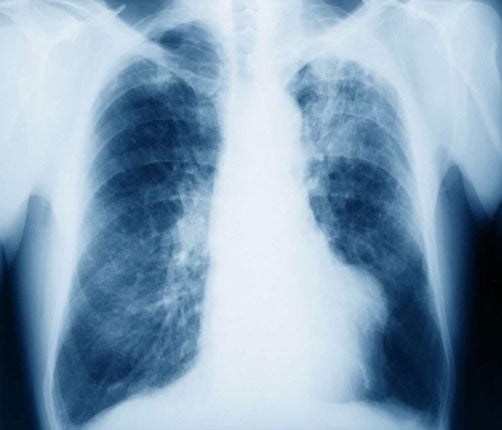Scientists ask for sufferers of the asbestos-related cancer mesothelioma to step forward to boost research

Your support helps us to tell the story
From reproductive rights to climate change to Big Tech, The Independent is on the ground when the story is developing. Whether it's investigating the financials of Elon Musk's pro-Trump PAC or producing our latest documentary, 'The A Word', which shines a light on the American women fighting for reproductive rights, we know how important it is to parse out the facts from the messaging.
At such a critical moment in US history, we need reporters on the ground. Your donation allows us to keep sending journalists to speak to both sides of the story.
The Independent is trusted by Americans across the entire political spectrum. And unlike many other quality news outlets, we choose not to lock Americans out of our reporting and analysis with paywalls. We believe quality journalism should be available to everyone, paid for by those who can afford it.
Your support makes all the difference.Scientists looking into possible treatments for the asbestos-related cancer mesothelioma are asking patients and their families to help steer future clinical research.
A survey has been launched aimed at better understanding the diagnosis, treatment and care of people with the disease, dubbed the “hidden killer” by the Health and Safety Executive.
Researchers hope that patients, carers and clinicians will raise concerns about their experience and allow for the compilation of 10 aspects of mesothelioma which could benefit from research.
The survey is being carried out as part of a project by the Priority Setting Partnership which is funded by the National Institute for Health Research and the results are set to be published later this year.
“It is vital that we gather and listen to the views of as many people as possible so everyone knows the topics that are a priority for clinical research,” says Professor Dame Sally C. Davies, chief medical officer and chief scientific adviser at the Department of Health.
“Mesothelioma research has been identified as an important area and everyone needs to hear what patients, carers, families and healthcare professionals believe are the most important unanswered questions around the diagnosis, treatment and care of mesothelioma.”
Mesothelioma is a cancer of the membrane which covers the internal organs and it is currently incurable. Patients live, on average, for eight months following diagnosis. There is a direct link between the disease and the inhalation of asbestos fibres and it can take around 30 years for the effects to be seen.
The latest government figures show the disease caused 2,291 deaths in Britain in 2011 and the disease is set to reach its peak in 2016. Yet research funding is low. According to Lord Alton of Liverpool, the British Lung Foundation invested £1 million in 2011 but the government did not inject any funding.
The survey is being supported by a number of health organisations including the British Lung Foundation, Mesothelioma UK, The Mick Knighton Mesothelioma Research Fund, Asbestos Victims Support Groups Forum UK, The June Hancock Mesothelioma Research Fund, and Cumbria Asbestos-Related Disease Support.
Graham Sherlock-Brown, who has been diagnosed with mesothelioma, said: “It is essential that research money is put into finding ways to relieve the suffering caused by this aggressive disease.
“Progress in treatment is long overdue and mesothelioma victims deserve far better – very few survive past five years and mesothelioma will continue to claim victims as long as asbestos is present in the UK.
“That’s why I’m pleased to see the launch of this important survey, which gives patients and carers a much-needed voice.”
Asbestos was widely used in commercial buildings, homes and schools and was hailed for its strength and fire retardant properties.
Following a confirmed link between asbestos and mesothelioma, blue and brown asbestos was banned in the UK in 1985. White asbestos was banned in 1999 although it remains in many buildings to this day.
New cases of mesothelioma have increased fourfold since the 1980s. Asbestos exposure can also cause asbestosis, plural plaques, plural thickening and lung cancer.
The survey is available at www.psp.nihr.ac.uk/mesothelioma/survey
Join our commenting forum
Join thought-provoking conversations, follow other Independent readers and see their replies
Comments